#the complete book of les misérables
Quote
Other foreign productions [of Les Misérables] included [...] a memorable Italian version (1947) directed by Riccardo Freda [...]. This extremely expensive film included several thousand extras, and to give the barricades scenes greater realism, Freda pitched 'armies' of real-life Italian workers against squads of real-life students, some of them right-wingers. The mostly left-wing workers displayed considerable revolutionary zeal, and in the filmed mêlée, which got completely out of hand, sixty five extras were wounded.
— The Complete Book of Les Misérables, Edward Samuel Behr
...now that's authenticity
#les mis#les miserables#les mis text#les miserables 1948#my text#random les mis#the complete book of les misérables#i LIVE for this kind of stories#there's something about all things hugo that summons the weirdness#now i want a movie about the making of the italian film with parallels drawn between early 19th century france and fascist/post war italy
146 notes
·
View notes
Text
Les Mis Letters 2024 Informational Masterpost
Les Mis Letters is a Dracula-Daily-inspired email subscription that sends you a chapter of Les Misérables once a day for a year.
There are 365 chapters in Les Mis, most of which are short, and 365 days in a year— so this email subscription is a great way to make it through the Brick! We begin on January 1st and end on December 31st.
Subscribe to Les Mis letters at our Substack here.
You can also join the discussion in our “book club” discord server here.
The email schedule for the upcoming year can be found here. Because 2024 is a Leap Year, the dates will be slightly different from 2023.
Finally, we’re very active on Tumblr! Here are some optional Les Mis Letters Tumblr Tips, based on what worked well last year:
Read what you can and post what you can! You don't need to be completely "caught up" to add your thoughts on the current chapters.
Tag your posts with #Les Mis and #Les Mis Letters.
Tag specific chapters with “lm” and then the volume number, book number, and chapter number. For example, Les Mis Volume 1 Book 2 Chapter 1 is “#lm 1.2.1.” Les Mis Volume 5 Book 4 Chapter 1 is "#lm 5.4.1." This makes it easy for people to find your posts about specific chapters!
Feel free to reply to older meta posts with new thoughts.
@ this blog if you see a great post related to the current chapters that we’ve overlooked!
Any other questions? Check out our FAQ or send us an ask here.
Les Mis Letters was created by Rachel but has now been passed on to Mellow. You can talk Mellow on this blog, at @secretmellowblog on Tumblr, or in the Les Mis Letters discord server.
Thank you for following along!
-mod Mellow
117 notes
·
View notes
Text
Best Musical World Cup Knockout Stage
After careful vote calculations, I have seeded the 32 remaining musicals into the knockout stage bracket. This post will be updated with links to the polls.
Links to the first stage of the competition are here!
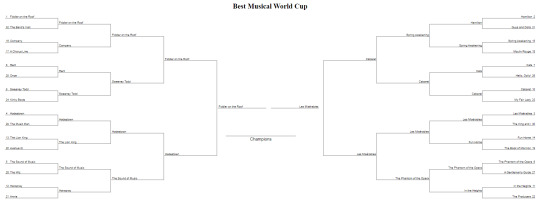
Polls are below the read more link.
Final
Fiddler on the Roof v. Les Misérables
Bronze Medal Match
Hadestown v. Cabaret
Semifinals - Now Complete
Fiddler on the Roof v. Hadestown
Cabaret v. Les Misérables
Quarterfinals - Now Complete
Fiddler on the Roof v. Sweeney Todd
Hadestown v. The Sound of Music
Spring Awakening v. Cabaret
Les Misérables v. The Phantom of the Opera
Round of 16 - Now Complete
Fiddler on the Roof v. Company
Rent v. Sweeney Todd
Hadestown v. The Lion King
The Sound of Music v. Hairspray
Hamilton v. Spring Awakening
Cats v. Cabaret
Les Misérables v. Fun Home
The Phantom of the Opera v. In the Heights
Round of 32 - Now Complete
Fiddler on the Roof v. The Band's Visit
Company v. A Chorus Line
Rent v. Once
Sweeney Todd v. Kinky Boots
Hadestown v. The Music Man
The Lion King v. Avenue Q
The Sound of Music v. The Wiz
Hairspray v. Annie
Hamilton v. Guys and Dolls
Spring Awakening v. Moulin Rouge
Cats v. Hello, Dolly!
Cabaret v. My Fair Lady
Les Misérables v. The King and I
Fun Home v. The Book of Mormon
The Phantom of the Opera v. A Gentleman's Guide to Love and Murder
In the Heights v. The Producers
#best musical world cup#best musical#broadway#musical theater#musical theatre#musicals#theater#tony awards#theatre
335 notes
·
View notes
Text
Les Misérables 5.4 - Javert Off the Track
I have to say again how well I think the musical expresses the core of this chapter despite having far fewer lines to work with.
Book: Give up Jean Valjean, that was wrong; leave Jean Valjean free, that was wrong. In the first case, the man of authority would fall lower than the man of the galley; in the second, a convict rose higher than the law and set his foot upon it.
Musical: Damned if I live in the debt of a thief! Damned if I yield at the end of the chase!
Book: Javert felt that something horrible was penetrating his soul, admiration for a convict. Respect for a galley-slave, can that be possible? He shuddered at it, yet could not shake it off. It was useless to struggle, he was reduced to confess before his own inner tribunal the sublimity of this wretch. That was hateful.
Musical: How can I now allow this man / To hold dominion over me
Book: “This convict, this desperate man, whom I have pursued even to persecution, and who had me beneath his feet and could have avenged himself, and who ought to have done so as well for his revenge as for his security, in granting me my life, in sparing me, what has he done? His duty? No. Something more.
Musical: This desperate man who I have hunted / He gave me his life, he gave me freedom / I should have perished by his hand / It was his right
Book: But also why had he permitted this man to let him live? He had, in that barricade, the right to be killed. He should have availed himself of that right. To have called the other insurgents to hus aid against Jean Valjean, to have secured a shot by force, that would have been better. His supreme anguish was the loss of all certainty.
Musical: It was my right to die as well / Instead I live, but live in hell!
Book: acts of violence committed by pity upon austerity, respect of person, no more final condemnation, no more damnation, the possibility of a tear in the eye of the law, a mysterious justice according to God going counter to justice according to men. [Note: this is one area where I think the musical errs with Javert - it roots his inflexibility in a (rather Calvinist, for a majority Catholic nation) view of Christianity. That is not the case in the book, where Javert’s religion is the law, the state, order, and in the end that worldview breaks upon the rocks of Christianity.]
Musical: Shall his sins be forgiven? Shall his crimes be reprieved?
Book: He saw before him two roads, both equally straight; but he saw two; and that terrified him - him, who had never in his life known but one straight line.
Musical: And must I now begin to doubt? / Who never doubted all those years
Book: To be granite, and to doubt! to be the statue of penalty cast in a single piece in the mould of the law, and to suddenly percieve that you have under your breast of bronze something preposterous and disobedient which almost resembles a heart!
Musical: My heart is stone and yet it trembles!
Book: To have the unknown over his head, he was not accustomed to that…Now Javert was thrown over backward, and he was abruptly startled by this monstrous apparaition: a gulf on high…
The darkness was complete…A ceiling of cloud concealed the stars. The sky was only an ominous depth
Musical: The world I have known is lost in shadow!…I am reaching, but I fall / And the stars are black and cold / As I stare into the void / Of a world that cannot hold
Book: But how to manage to send in his resignation to God?…
Unnatural state, if ever there was one. There were only two ways to get out of it. One, to go resolutely to Jean Valjean, and to return the man if the galleys to the dungeon. The other –
Musical: I’ll escape now from that world / From the world of Jean Valjean
Book: Could that be endurable? No.
Musical: There is nowhere I can turn / There is no way to go on!
70 notes
·
View notes
Note
Hiya! So I've been reading Les Misérables recently and also thinking about tarot. If you could draw a deck, who/what would you choose to put on each card? For me, it's obvious sometimes (Marius and Cosette as the Lovers, Bishop Myriel as the Hierophant) but less obvious other times (Empress????? there are only 3 female characters in the entire book and Éponine is so firmly the Tower to me ((because she's been residing in struggle city for the last 100+ years)) but I don't know if Cosette or Fantine fit). I also don't know if it's weird to have Enjolras as two cards because he fits both Justice (that scene with Le Cabuc hello) and the Sun (everything) to a T!
So uhhhh yeah it would be interesting to hear your thoughts
Oh hi! :D I'm honored that you're curious enough to ask! To be completely honest, I don't feel like I know enough about tarot to be able to offer a ton of insight. ^^; I tried going through the characters a long time ago and assigning them tarot cards, but that was years ago now and I doubt I'd even agree with my own reasoning at the time.
However! I do remember what I'd assigned Enjolras, and I still think it's cool conceptually. He does make a good Sun, but I had put him as The Hanged man, specifically because of this imagery from the 2012 movie vs the classic card:
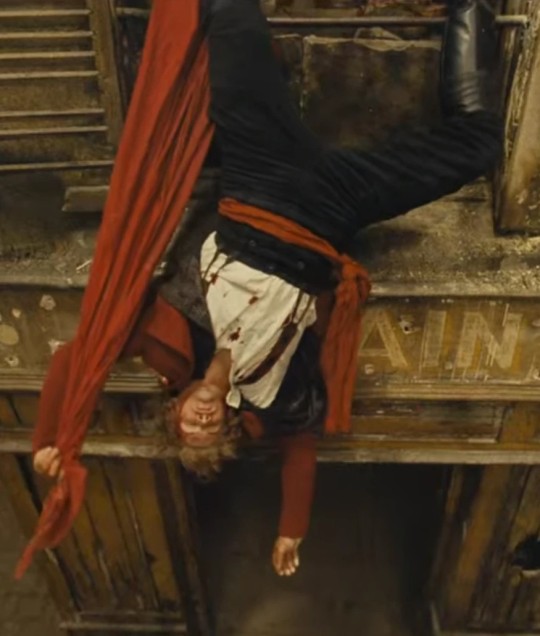
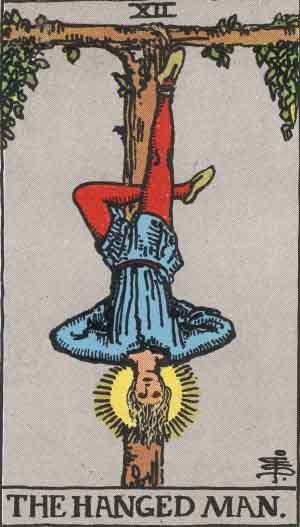
And this description I found of the card:
The Hanged Man shows a man suspended from a T-shaped cross made of living wood. He is hanging upside-down, viewing the world from a completely different perspective, and his facial expression is calm and serene, suggesting that he is in this hanging position by his own choice. He has a halo around his head, symbolizing new insight, awareness and enlightenment. His right foot is bound to the tree, but his left foot remains free, bent at the knee and tucked in behind his right leg[...]
The Hanged Man is the card of ultimate surrender, of being suspended in time and of martyrdom and sacrifice to the greater good.
What with Enjolras telling the national guard to shoot him in the brick, and the halo imagery, coupled with this specific staging of him hanging by one leg, I simply cannot resist that pairing. Maybe someday I'll actually draw it, who knows.
Thank u for the ask!!
#les mis#enjolras#tarot#asks#les miserables#sorry I don't have more to offer lowqualityjonathanposts!!#i do enjoy hearing your tarot takes though and I hope this was at least a satisfying answer for enjolras
26 notes
·
View notes
Text
How many of these "Top 100 Books to Read" have you read?
(633) 1984 - George Orwell
(616) The Great Gatsby - F. Scott Fitzgerald
(613) The Catcher In The Rye - J.D. Salinger
(573) Crime And Punishment - Fyodor Dostoyevsky
(550) Catch-22 - Joseph Heller
(549) The Adventures Of Tom And Huck - Series - Mark Twain
(538) Moby-Dick - Herman Melville
(534) One Hundred Years Of Solitude - Gabriel Garcia Marquez
(527) To Kill A Mockingbird - Harper Lee
(521) The Grapes Of Wrath - John Steinbeck
(521) Lolita - Vladimir Nabokov
(492) Pride And Prejudice - Jane Austen
(489) The Lord Of The Rings - Series - J.R.R. Tolkien
(488) Brave New World - Aldous Huxley
(480) Ulysses - James Joyce
(471) Jane Eyre - Charlotte Bronte
(459) Wuthering Heights - Emily Bronte
(398) The Brothers Karamazov - Fyodor Dostoyevsky
(396) Great Expectations - Charles Dickens
(395) To The Lighthouse - Virginia Woolf
(382) War And Peace - Leo Tolstoy
(382) The Sun Also Rises - Ernest Hemingway
(380) The Sound And The Fury - William Faulkner
(378) Alice's Adventures In Wonderland - Series - Lewis Carroll
(359) Frankenstein - Mary Wollstonecraft Shelley
(353) Heart Of Darkness - Joseph Conrad
(352) Middlemarch - George Eliot
(348) Animal Farm - George Orwell
(346) Don Quixote - Miguel de Cervantes Saavedra
(334) Slaughterhouse-Five - Kurt Vonnegut
(325) Les Misérables - Victor Hugo
(320) Harry Potter - Series - J.K. Rowling
(320) The Chronicles Of Narnia - Series - C.S. Lewis
(317) Anna Karenina - Leo Tolstoy
(308) Lord Of The Flies - William Golding
(306) Invisible Man - Ralph Ellison
(289) The Golden Bowl - Henry James
(276) Pale Fire - Vladimir Nabokov
(266) Gone With The Wind - Margaret Mitchell
(260) The Count Of Monte Cristo - Alexandre Dumas
(255) The Hitchhiker's Guide To The Galaxy - Series - Douglas Adams
(252) The Life And Opinions Of Tristram Shandy, Gentleman - Laurence Sterne
(244) Madame Bovary - Gustave Flaubert
(237) Vanity Fair - William Makepeace Thackery
(235) The Trial - Franz Kafka
(233) Absalom, Absalom! - William Faulkner
(232) The Call Of The Wild - Jack London
(232) Emma - Jane Austen
(229) Beloved - Toni Morrison
(228) Little Women - Louisa May Alcott
(224) A Passage To India - E.M. Forster
(215) Dune - Frank Herbert
(215) A Portrait Of The Artist As A Young Man - James Joyce
(212) The Stranger - Albert Camus
(209) One Flew Over The Cuckoo's Nest - Ken Kesey
(209) The Idiot - Fyodor Dostoyevsky
(206) Dracula - Bram Stoker
(205) The Picture Of Dorian Gray - Oscar Wilde
(197) A Confederacy Of Dunces - John Kennedy Toole
(193) Mrs. Dalloway - Virginia Woolf
(193) The Age Of Innocence - Edith Wharton
(193) The History Of Tom Jones, A Foundling - Henry Fielding
(192) Under The Volcano - Malcolm Lowry
(190) The Odyssey - Homer
(189) Gulliver's Travels - Jonathan Swift
(188) In Search Of Lost Time - Marcel Proust
(186) Midnight's Children - Salman Rushdie
(185) An American Tragedy - Theodore Dreiser
(182) The Book Thief - Markus Zusak
(180) Siddhartha - Hermann Hesse
(179) The Magic Mountain - Thomas Mann
(178) Things Fall Apart - Chinua Achebe
(178) Tropic Of Cancer - Henry Miller
(176) The Outsiders - S.E. Hinton
(176) On The Road - Jack Kerouac
(175) The Little Prince - Antoine de Saint-Exupery
(173) The Giver - Lois Lowry
(172) Brideshead Revisited - Evelyn Waugh
(172) A Clockwork Orange - Anthony Burgess
(171) Charlotte's Web - E.B. White
(171) The Ambassadors - Henry James
(170) Infinite Jest - David Foster Wallace
(167) The Complete Stories And Poems - Edgar Allen Poe
(166) Ender's Saga - Series - Orson Scott Card
(165) In Cold Blood - Truman Capote
(164) The Wings Of The Dove - Henry James
(163) The Adventures Of Augie March - Saul Bellow
(162) As I Lay Dying - William Faulkner
(161) The Hunger Games - Series - Suzanne Collins
(158) Anne Of Greene Gables - L.M. Montgomery
(157) Atlas Shrugged - Ayn Rand
(157) Neuromancer - William Gibson
(156) The Help - Kathryn Stockett
(156) A Song Of Ice And Fire - George R.R. Martin
(155) The Good Soldier - Ford Madox Ford
(154) The Da Vinci Code - Dan Brown
(153) I, Claudius - Robert Graves
(152) Wide Sargasso Sea - Jean Rhys
(151) The Portrait Of A Lady - Henry James
(150) The Death Of The Heart - Elizabeth Bowen
#books#book lists#p#im posting this so i can reblog it with my own crossed out list and i encourage others to do the same if you want to#i dont actually know how many ive read yet myself
20 notes
·
View notes
Text
Suggestions for Tumblr's next book club
With Dracula Daily on the horizon again, I've been pondering what other out-of-copyright novels we might like to consider reading very slowly. Here are my ideas! And if any of them already exist, lmk.
North and South
Author: Elizabeth Gaskell
Year of publication: 1854-55
Length: 185,000 words, 52 chapters. So we could have a chapter weekly for a full year.
Summary: Margaret Hale is forced to leave the rural south of England and settle in the rough, industrial north. There she clashes with mill-owner John Thornton over his treatment of his workers...
Why Tumblr would like it: Enemies to Lovers! Class struggle! Fascinating historical context! Honestly, it's a great read.
Evelina
Author: Fanny Burney
Year of publication: 1778
Length: 157,000 words in 84 letters. That's right, it's epistolary, and the letters are almost all sent March to October of the same year, so we could read this one in true Dracula Daily fashion.
Summary: Evelina is the sheltered daughter of an aristocrat trying to make her way in the world of late 18th-century society.
Why Tumblr would like it: Evelina is a likeable, relatable character. I think it'd be fun to get emails from her.
The Well of Loneliness
Author: Radclyffe Hall
Year of publication: 1928
Length: 158,000 words in 56 chapters.
Summary: The story of Stephen Gordon, a girl who realises at an early age that she's a lesbian, and her attempts to find love in the early 20th century.
Why Tumblr would like it: It's one of the most iconic lesbian novels of the 20th century!
The War of the Worlds
Author: HG Wells
Year of publication: 1897
Length: 63,000 words in 27 chapters.
Summary: Alien invaders land from Mars and fuck up the south of England.
Why Tumblr would like it: Alien invaders land from Mars and fuck up the south of England, come on, what's not to like?
The Moonstone
Author: Wilkie Collins
Year of publication: 1868
Length: 200,000 words (so a bit of a marathon) in 51 chapters.
Summary: A young English woman inherits a large Indian diamond of dubious provenance on her 18th birthday. Then it gets stolen!
Why Tumblr would like it: One of the first detective novels, and supposed to be one of the best, it's a page turner with lots of suspense, twists and cliffhanger endings.
The Mysterious Affair at Styles
Author: Agatha Christie
Year of publication: 1920
Length: 60,000 words in 13 chapters.
Summary: The first murder mystery starring Hercule Poirot.
Why Tumblr would like it: Look, you liked Glass Onion, right? And if you like this, Agatha Christie's novels are emerging from copyright at the rate of about two per year.
Les Misérables
Author: Victor Hugo
Year of publication: 1862
Length: 570,000 words in the English translation (ouch) in 365 chapters.
Summary: A vast, sweeping story of poverty, justice and revolution in early 19th century France.
Why Tumblr would like it: Well, if you thought Moby Dick didn't have enough digressions...
The Canterbury Tales
Author: Geoffrey Chaucer
Year of publication: 1387-1400
Length: 24 stories averaging 700 lines each.
Summary: Some pilgrims are heading to Canterbury. They tell one another stories to pass the time. These are their stories.
Why Tumblr would like it: I mean, there's a reason we still read these 600 years later. They're a fascinating insight into medieval life, but they're also - for the most part - just good fun.
If you love any of these suggestions and would really like to see it take off, reblog to help make it happen.
#tumblr book club#north and south#evelina#the well of loneliness#the war of the worlds#the moonstone#poirot#les miserables#the canterbury tales
115 notes
·
View notes
Text

hello all. this is from page 20 of edward behr’s the complete book of les misérables and i cannot for the life of me figure out where this rumor might have come from. i’m working from the assumption that it’s not goncourt, barrés, or rolland (because why wouldn’t he have just cited them instead of “one writer”) but i haven’t looked at their accounts to be sure (it’s high on my to-do list). any ideas or clues whatsoever would be very greatly appreciated
#chronique d’un apothéose#<- that’s my tag for the funeral project i’ve decided#les mis#les miserables#victor hugo#enjolras#<- for reach
31 notes
·
View notes
Text
The Secret Ingredients for Writing Theme
Many people in the writing community caution against writing with a theme in mind. They argue that if you do, your story will feel contrived, or worse, preachy. But this is only true if you don’t know what you are doing. And for many writers, unfortunately, that is exactly the case.
Setting, characters, and plot are much more concrete, and are—more or less—physical. Theme is the abstract component of story, but this doesn’t mean it’s less important or completely inaccessible. Theme can be controlled and understood just as setting, characters, plot, or even structure can. One of the primary problems, though, is that so few writers can identify, let alone understand and utilize, its components.
Hi all, September C. Fawkes here ( @septembercfawkes ), and I’m going to share the secret ingredients of theme.
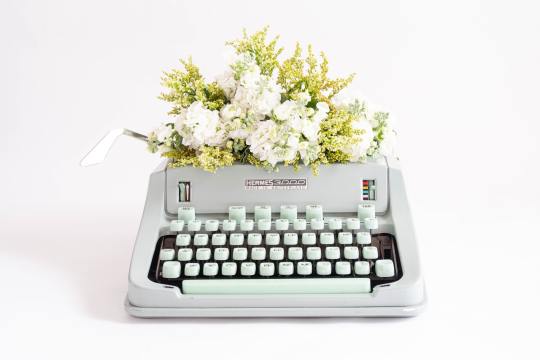
The Abstract Components of Theme
First, I need to make sure we start on the same page by defining theme. Some define theme as an argument made through the story, while others define it as a recurring topic that is explored through the story. So, which is it?
The truth is, both viewpoints are critical to creating a strong theme; this is why I often prefer to break theme down into parts:
The thematic statement is what the story is arguing (and it should be able to fit a complete sentence)—this is proven true by the end of the story.
The theme topic is the subject the story explores, through the middle of the story. It will be included in the thematic statement.
For example, in Star Wars: Episode IV - A New Hope the thematic statement is that “we should trust in faith” (as is illustrated through the Force). This is proven true at the end of the story when Luke chooses to rely on the Force instead of technology to destroy the Death Star.
The theme topic is “faith,” which is what the Force represents. The Force (i.e. “faith”) is explored through the story, particularly as Luke begins to learn about it, but also through others interacting with and voicing their opinions on it.
Beyond the thematic statement and the theme topic, I like to add what I personally call the anti-thematic statement and the anti-theme topic. After all, if a theme contains an argument, then your story needs a counterargument: You can’t really argue if no one is disagreeing.
In Star Wars, the anti-thematic statement is that “we should rely on technology.” And the anti-theme topic is “technology.” The anti-thematic statement is ultimately proven false when Luke turns off technology to blow up the Death Star (which is, itself, the most powerful form of technology in the story). And the topic is likewise explored through the characters’ experiences and voiced opinions on it.
The theme and anti-theme will essentially be opposites within the story.
Harry Potter: “Love is the most powerful force(magic) in the world.” vs. “Hatred is the most powerful force in the world.”
Les Misérables: “Mercy is more powerful than justice.” vs. “Justice is more powerful than mercy.”
The Hunger Games: “We should sacrifice ourselves to save others.” vs. “We must sacrifice others for our survival.”
In short, a strong theme has, at least, four critical (abstract) components: the thematic statement, the theme topic, the anti-thematic statement, the anti-theme topic. There are, admittedly, more, but because I don’t plan on writing a book-length article today, I’ll keep it simple. 😉
When you understand that a theme needs an anti-theme, you will be well on your way to writing with a theme without being contrived and preachy; one of the reasons those issues show up is because the author doesn’t fairly explore and argue (or even include) an opposing worldview.
That’s great and all, September—you may be thinking—but how do I actually create theme in a story?
I’m so glad you asked. 😉

Shaping Theme Through Story
Remember how I said that theme is the abstract component of story?
This makes it tricky to create. Personally, I like to think of theme as your story’s shadow—or perhaps more accurately, its shadow puppet.
The other pieces—setting, character, and plot—are essentially concrete. But theme comes out of them when an outside intelligence (writer or reader) shines light on them. This casts a shadow, or rather, a shadow puppet.
Working with theme can be tricky because you can’t hold and mold the shadow itself. In order to create the puppet you want, you have to rearrange the hands (the other story elements) in the proper way.
You can’t cast a blob on the wall and insist that it’s a rabbit. It’s ineffective, and the audience won’t believe you. (And yet so many writers try to do this when they attempt to slap a theme on their stories (often through long philosophical monologues).)
Instead, you must work with the concrete parts—the “hands”—to create the desired shape.
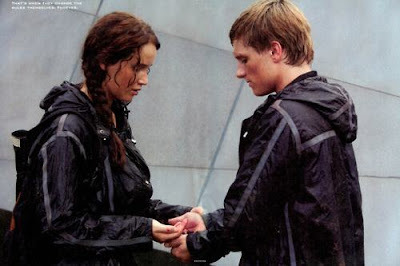
The Concrete Components of Theme
Critical Thematic Pieces
1. The Protagonist
As the protagonist arcs through the story, he or she will arc in a way that taps into a worldview, belief system, or lifestyle. Often, the character has a dominant quality that will be challenged in the story. Harry flips from being hated by the Dursleys to learning he was so loved by his mother, he has a powerful protective magic. Jean Valjean offers mercy to others time and time again, despite being challenged by Javert.
How your protagonist changes or remains steadfast, and how your protagonist succeeds or fails, in the plot, conveys a value on those belief systems.
2. The Antagonistic Force
Because the antagonistic force is challenging the protagonist, it often embodies, represents, or taps into the opposing argument. If your protagonist has a positive arc (as is most common), this frequently means the antagonist will relate to the anti-theme. Voldemort doesn’t understand love, and mistakenly believes exercising hatred will lead to power. In The Hunger Games, the Capitol sacrifices innocent children for its own gain.
3. The Climax
At the climax, the protagonist and antagonist will go head to head and the main conflict will be resolved. Who wins and how conveys a teaching about the belief systems.
Jean Valjean extends mercy to Javert, who is so enveloped in justice that he cannot go on living, and takes his own life.
Katniss must defeat the antagonistic force by proving she will do more than simply save herself and survive. She must be willing to risk sacrificing herself to possibly save Peeta and beat the Games.
The fact the protagonist succeeds proves their conclusive worldview “correct” (simplistically speaking). Alternatively, in negative arcs, this is often reversed—the protagonist fails because they embraced the incorrect worldview (the anti-theme).

Supporting Thematic Pieces
1. The Influence Character
Often the protagonist has a key relationship with another character—this may be an ally, friend, love interest, coworker, mentor, child, or what have you. Typically, this relationship makes up a secondary plotline. Dramatica Theory calls this role the “Influence Character” because the person has power based on how they influence the protagonist.
The protagonist and Influence Character are often tied together in plot, but have opposing methodologies—because they have different worldviews. This taps into the theme.
Most of the time, the Influence Character has a worldview that the protagonist comes to understand and adopt—a worldview that is "correct." In other stories, this is reversed and the Influence Character adopts the protagonist’s worldview.
In Star Wars, Obi-Wan is the Influence Character, and his methods revolve around relying on the Force, which Luke eventually comes to adopt. Because they share a plot goal, but different methods, this allows room for the theme topic of faith (the Force) to be explored more easily as they struggle to work together.
2. The Supporting Cast
Ideally, the supporting cast will also be feeding into the theme by offering different experiences and perspectives on the theme topic (and possibly the anti-theme topic). While Harry is hated by the Dursleys, Dudley is so loved by them that he’s spoiled rotten. Ron feels least loved as the last son of a large family, and Hermione is disliked and a loner, until the boys eventually befriend her.
While Obi-Wan talks of trusting the Force, Han Solo shares why he doesn’t believe in such things while opting to use technology.
3. Secondary Plots
Often secondary plots will mirror and foil the primary plot, and therefore tap into theme. In the plotline with Hermione above, Hermione moves from being, in a sense, unloved, to being loved, just like Harry.
However, I admit, this approach is more obvious in the second installment, Harry Potter and the Chamber of Secrets, which argues that your choices make you who you are (theme), not what you are born as (anti-theme). Hermione being bullied for being a mudblood, Hagrid being used as a scapegoat for being half-giant, and Dobby being forced to serve the Malfoys for being a house elf, all mirror the thematic and anti-thematic arguments.
In Les Mis, the rebellion plotline offers another way to explore the topics of mercy and justice within society.

Critical Pieces vs. Supporting Pieces
The critical pieces are the "bones" of the shadow puppet. The supporting parts provide the "flesh" (they add breadth, density, or depth to the shadow).
Because the critical pieces are the bones, they inherently make the shadow puppet when the light shines on them. If you want to cast a rabbit shadow puppet, you need to arrange them into that. You can never cast a shadow that doesn’t match the bones.
On the other hand, the supporting pieces aren’t as vital, so they give you more wiggle room. They may reinforce the thematic argument, making the theme more straightforward, or they may contrast the argument, making the theme more complex.
All in all, make sure the concrete components of your story “show” the theme you want to write, and rearrange them until they do. This means they will need to tap into and illustrate the thematic statement and theme topic as well as the anti-thematic statement and anti-theme topic.
This will set you on a path that will have you identifying, understanding, and utilizing theme better than ever before.
#writing tips#writing tips and tricks#writeblr#writing help#writing reference#writing advice#writing theme#September C Fawkes
358 notes
·
View notes
Note
History ask no. 19?
@suffrajetpack asked me the same question:
Favourite historical book?
So I will answer this in two ways: favourite book about history and favourite book from history.
Unravelling the Franklin Mystery: Inuit Testimony by David C. Woodman is what I'll choose for a favourite book about history. I read this many years ago and it was mind-blowing to me. I had grown up on a steady diet of books about the Franklin Expedition, and while these sometimes included Inuit accounts of Franklin's men, they never correlated different testimonies or tried to make a cohesive narrative out of them. For a long time the Standard Narrative of the Franklin Expedition was that the men abandoned their ships in 1848 and attempted to walk out of the arctic, never to return to the ships, and Owen Beattie's 1980s discoveries only added "plus lead poisoning!" to this story.
While all that lead in the Franklin Expedition tinned foods probably did not help them, the consensus nowadays is that it ultimately had little effect on their fate, and the lead levels found in skeletal remains are actually not out of line for the typical urban Victorian. But Beattie and Geiger made it seem like the ultimate smoking gun in Frozen In Time: literally everything that went wrong was because of lead poisoning, somehow. Three men died the first winter because of lead poisoning! So many officers died because of lead poisoning from more canned food! They made poor decisions to walk south and not east towards the whaling fleet because... yeah you guessed it.
So I really did think that Franklin's men were completely lead-addled. And while this made them more sympathetic, in a way, because it excused their actions, it also stripped them of agency if not humanity. Learning from Woodman's careful reconstruction of events that Franklin's men were fighting for their lives as much as they could, actually making rational decisions despite all the odds stacked against them (which included being beset for two years in an isolated area with no game that was avoided by Inuit, who were also experiencing famine in the late 1840s); that turned all my assumptions upside-down. Pierre Berton sneered in The Arctic Grail that Franklin's men died while dragging useless junk because they were too stupid to live; in Woodman's book this was presented as a tactical decision to lighten the ships by dumping useless items on the shores on King William Island. Many such cases!
And for my favourite book from history: here's where I should put some celebrated classic like Les Misérables but SURPRISE!! It's The Naval Officer (Frank Mildmay) by Frederick Marryat. Love me an overwrought vindictive S.O.B. from 1829!
#asks#fyi i really hate the 'franklin's men were starving while the inuit were eating well and happy' false narrative#the inuit were ALSO starving and experiencing hardship#they just had superior knowledge of living off the land and did not travel in groups of 105+ people as subsistence hunters#no i didn't watch the terror tv show it's not my cup of tea#thank you both for the question!#me in hell: WHERE IS PIERRE BERTON?!
19 notes
·
View notes
Text
Hamilton Manila 2023!
As a musical theatre girlie who lives far away from the capital city, it's a bit hard to catch artists and musicals when they tour in my country. It can also be quite expensive since I have to pay for my flight and book Airbnbs. But when Lin-Manuel Miranda announced that Hamilton would have its Asian premiere in the Philippines early this year, I promised myself I would not throw away my shot.
I first discovered this musical in the summer of 2016, probably a month before it garnered big awards — including Best Musical! — at the Tonys. Having only heard of Breathe from LMM's other show, In The Heights, back then, I was surprised to hear rap and hip-hop in a Broadway musical. Nevertheless, I was hooked! Every song was catchy, and the lyrics were smart and informative. Satisfied and Helpless became my favorite songs, with It's Quiet Uptown making me cry whenever I hear the four words: "Forgiveness, can you imagine?"
After watching The Phantom of the Opera back in March 2019, I was so excited to go back to Solaire and watch another musical. This time, I was able to enjoy my second theatre experience with my college friends. It seems very fitting that I get to share this moment with them. Back in college, we used to sing songs from Hamilton during breaks and enact the dance from The Schuyler Sisters. We even made a parody of the song Alexander Hamilton when making a presentation about Confucius for our Asian Civilization class!
While Solaire didn't have many different backdrops for photo ops for Hamilton like they did for POTO, my friends and I were still able to take cute pictures!





As a partnership with UnionBank, they also offer free holographic souvenir cards for the first 140 people (150 on the weekends, iirc), so coming to the theatre four hours earlier is definitely worth it! Here's my card with my friends:

My friends and I also enjoyed complimentary drinks from Solaire since it was our first time signing up for Solaire Rewards. Don't throw away your shot for free drinks!
Okay, now for the show itself! Although most of my friends were hoping to watch the show in the orchestra seats, we ended up on the balcony. After a while, I realized that Hamilton is certainly best viewed on the balcony since we're able to see the rotating stage more clearly, as well as the incredible choreography and lighting design.
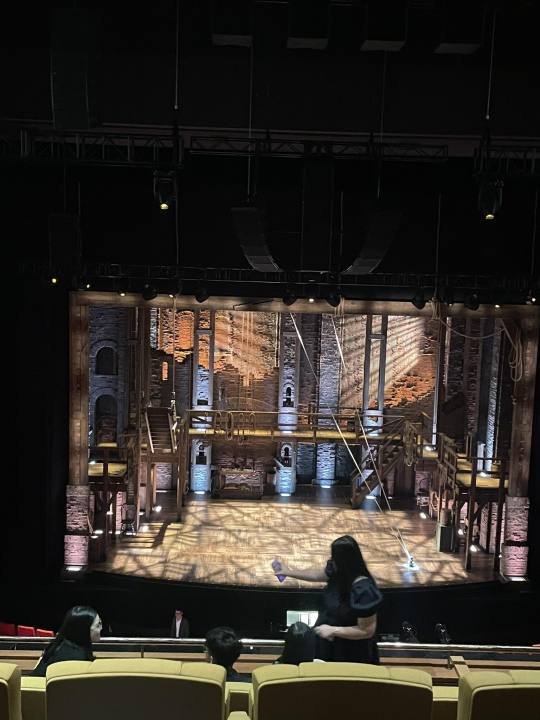

Here's the main cast we saw on October 31:


Like most Filipinos, I was hoping to see Rachelle Ann Go as Eliza. "Pinoy Pride" is something of a cheesy inside joke in our country, but hell, I'm so happy to see Rachelle thriving in West End productions, from Les Misérables to Hamilton. Seeing her portray Eliza live was one for the books. She was playful and giddy in Helpless, but she completely broke everyone's heart during Burn. And not to mention, her voice! Her singing highlights include Burn and the last part of Who Lives, Who Dies, Who Tells Your Story. She also shared wonderful chemistry with Callan Purcell, who played Hamilton in this production.
I was so looking forward to seeing Jason Arrow as Hamilton, but I still liked Callan's performance, even if his interpretation was completely different from other Hamiltons I've seen in slime tutorials. I especially liked him the best in Act 1. His "mature" Hamilton may not be that convincing at times in Act 2, but his energy was so infectious as the "ambitious" young Hamilton in the first half.
Another surprise was Kirrah Amosa's Angelica. I've read some comments in the Pinoy Hamilton FB group about her "lacking" portrayal of Angelica, but you know what? I thought she was great! Yes, she's giving more of an "empathetic Eliza" energy instead of the "fierce Angelica" we usually see, but that's what made her performance of Satisfied even more impactful to me. As for the third Schuyler sister, Peggy/Maria Reynolds, Elandrah Eramiha has a honey-like voice, which she completely showed off during Say No To This.
As a Burr apologist, I'm torn with Winston Hillyer's portrayal of Burr. Eliza's my overall favorite character in the show, but for me, Burr is the most relatable and grounded. I wasn't completely disappointed with his performance, but I just didn't think his character was able to "grow" in the second half. He has a very wonderful, crystal-clear voice, though!
Darnell Abraham as George Washington was also a main highlight of the show! Maybe it's because of his rich baritone voice, but I loved his father-son relationship with Callan. His Washington was thoughtful and deeply caring. (And dare I say I like him more than Chris Jackson from the OBC?)
Brent Hill was hilarious as King George, but I can't help comparing his performance with Jonathan Groff's. They both have brilliant comedic timing, but Jonathan's a much more menacing King George, whereas Brent is sassier and maybe even crazier!
Meanwhile, Hamilton's comrades: Marcus John and Trey Curtis, who played Lafayette/Jefferson and Mulligan/Madison respectively, also had so much chemistry with each other and stole the show so many times! Marcus reminded me so much of Daveed Diggs' little quirks in the show, but he was still great in his own way. I've read somewhere that Trey is also a standby for Hamilton and that he's amazing. Sigh... What I'd do to watch the show again and catch him as Hamilton! Julian Kuo was also very sweet as Laurens/Philip Hamilton, which made his death scenes twice as heartbreaking as usual.
Overall, I'm very much satisfied with this Hamilton cast!

Of course, Hamilton will not be complete without merch! Just like last time, I bought a boat tote bag because, like other Gen-Z kids, I'm obsessed with tote bags. We just can't help it! I also bought a lapel pin, so I can pin it to my other tote bags. I initially wanted to buy the button pin set, but unfortunately, it was sold out. I'm still pretty happy with my purchases, though!

Four days later, I'm back at home, and I still have post-show blues. I just listen to the OBC recording and the mixtape to keep me company. Maybe I'll rewatch the Disney+ pro-shot again!
Watching Hamilton was a dream come true and an experience I'll never forget anytime soon. I can't wait to watch my next musical again!
#hamilton#hamilton musical#hamilton international tour#hamilton manila 2023#lin manuel miranda#rachelle ann go#callan purcell#kirrah amosa#elandrah eramiha#winston hillyer#darnell abraham#brent hill#marcus john#trey curtis#julian kuo#the theatre at solaire#musical#musical theatre#personal
17 notes
·
View notes
Quote
Valjean's "Bring Him Home" [...] was, according to Kretzmer, one of the most difficult pieces of music to set words to. Originally, the idea had been to hint at Valjean's despair at Cosette's abandoning him for a younger man. 'We wanted to evoke the natural, latent sexuality in Valjean that must have been there, however sublimated', says Kretzmer.
— The Complete Book of Les Misérables, Edward Samuel Behr
.
...I am never complaining about “Bring Him Home” ever again
#les mis#les miserables#les mis text#les miserables musical#bring him home#jean valjean#cosette#the complete book of les misérables#les mis comments#my quotes#my text#and here i was thinking the musical had captured valjean and cosette's relationship perfectly#turns out we were just lucky#oh god FOR SHAME#this is the most popular of the bad les mis takes and it makes me mad every time
149 notes
·
View notes
Text
One thing I would like to be better at is writing devastating one-liners in my fiction. You know: the kind of pithy maxims that are quoted sagely for years beyond their time. Pearls of wisdom; amazing ideas in their own right; etc., as distinguished from a beautiful line of text in a larger story.
Great one-liners really stick with ya. I've collected my share over the years. Plenty of old Latin maxims, like "What people wish, they like to believe" or "Jupiter may do what the ox may not." Picard had more than his share of them in Star Trek, like "It is possible to commit no mistakes and still lose." I once heard an old civil rights activist say that "With your body, you can bear witness to the truth," meaning that understanding and purpose are often fulfilled only if one is physically present for something. And heck, some sayings are so eloquent that they stick with me even if I don't necessarily agree with them, like the line from Les Misérables (the musical, not the book) that says "To love another person is to see the face of God."
I like to spoof them sometimes, when they lend themselves to it, like my telefacsimile baron's reinterpretation of Bruce Lee: "I fear not the mate who sends one thousand faxes. I fear the mate who sends a single fax one thousand times!"
Unfortunately, beyond parodying, my style of writing, together with the way my mind works, make it very unlikely for me to be able sit down and write these zingers on demand. If I come up with them at all, it's usually completely unintentional and occurs in the course of writing larger passages concerning larger ideas.
But what I may lack in pithy maxims that are quotable forever, I amply make up for with vast spreading seas of text that meander ceaselessly to the ends of the world. The ideas are often quite fair, so perhaps someday someone pithier than me will rephrase them.
20 notes
·
View notes
Text
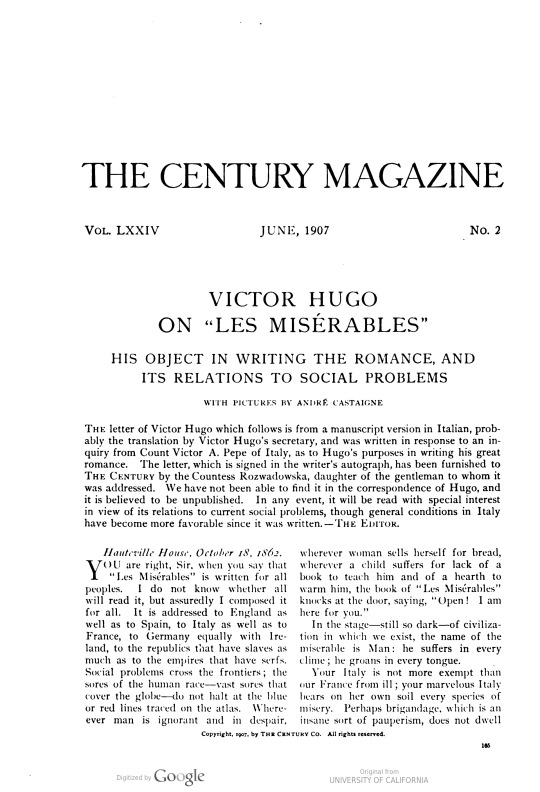

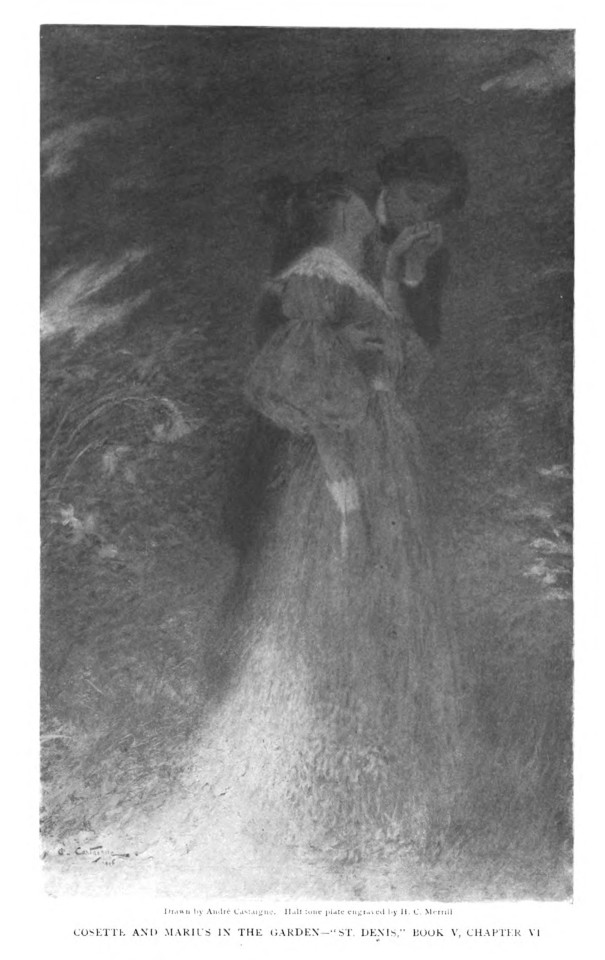


June 1907 Century Magazine published a letter said to be addressed to an Italian Count Victor A. Pepe, written by Victor Hugo, and translated into Italian "probably" by Hugo's secretary. The Count's daughter, Countess Rozwadowska, came into possession of the letter, believed to be unpublished, and shared it with the Century Magazine. However, I haven't been able to find out any more about Pepe or Rozwadowska.
You will probably recognize the letter in question (which I will put below the cut) as the one Hugo wrote to the publisher of the Italian translation of Les Miserables, M. Daelli of Milan. Perhaps it was first published in English in 1907 but it had definitely been published in French as early as 1890, at the end of the edition of Les Mis published by Émile Testard and I believe it was included in the original 1862/3 edition of the Italian translation, based on a google translate of this auction listing. The last mystery for me is the signature, which doesn't look to me like Victor Hugo's signature at all.
The letter was apparently quite interesting to English-speaking readers and I found several newspaper articles discussing its publication. If you know anything else about this letter please share!! I'm sure I've read something else about it...somewhere....
HAUTEVILLE-HOUSE, October 18, 1862.
You are right, sir, when you tell me that Les Misérables is written for all nations. I do not know whether it will be read by all, but I wrote it for all. It is addressed to England as well as to Spain, to Italy as well as to France, to Germany as well as to Ireland, to Republics which have slaves as well as to Empires which have serfs. Social problems overstep frontiers. The sores of the human race, those great sores which cover the globe, do not halt at the red or blue lines traced upon the map. In every place where man is ignorant and despairing, in every place where woman is sold for bread, wherever the child suffers for lack of the book which should instruct him and of the hearth which should warm him, the book of Les Misérables knocks at the door and says: "Open to me, I come for you."
At the hour of civilization through which we are now passing, and which is still so sombre, the miserable's name is Man; he is agonizing in all climes, and he is groaning in all languages.
Your Italy is no more exempt from the evil than is our France. Your admirable Italy has all miseries on the face of it. Does not banditism, that raging form of pauperism, inhabit your mountains? Few nations are more deeply eaten by that ulcer of convents which I have endeavored to fathom. In spite of your possessing Rome, Milan, Naples, Palermo, Turin, Florence, Sienna, Pisa, Mantua, Bologna, Ferrara, Genoa, Venice, a heroic history, sublime ruins, magnificent ruins, and superb cities, you are, like ourselves, poor. You are covered with marvels and vermin. Assuredly, the sun of Italy is splendid, but, alas, azure in the sky does not prevent rags on man.
Like us, you have prejudices, superstitions, tyrannies, fanaticisms, blind laws lending assistance to ignorant customs. You taste nothing of the present nor of the future without a flavor of the past being mingled with it. You have a barbarian, the monk, and a savage, the lazzarone. The social question is the same for you as for us. There are a few less deaths from hunger with you, and a few more from fever; your social hygiene is not much better than ours; shadows, which are Protestant in England, are Catholic in Italy; but, under different names, the vescovo is identical with the bishop, and it always means night, and of pretty nearly the same quality. To explain the Bible badly amounts to the same thing as to understand the Gospel badly.
Is it necessary to emphasize this? Must this melancholy parallelism be yet more completely verified? Have you not indigent persons? Glance below. Have you not parasites? Glance up. Does not that hideous balance, whose two scales, pauperism and parasitism, so mournfully preserve their mutual equilibrium, oscillate before you as it does before us? Where is your army of schoolmasters, the only army which civilization acknowledges?
Where are your free and compulsory schools? Does every one know how to read in the land of Dante and of Michael Angelo? Have you made public schools of your barracks? Have you not, like ourselves, an opulent war-budget and a paltry budget of education? Have not you also that passive obedience which is so easily converted into soldierly obedience? military establishment which pushes the regulations to the extreme of firing upon Garibaldi; that is to say, upon the living honor of Italy? Let us subject your social order to examination, let us take it where it stands and as it stands, let us view its flagrant offences, show me the woman and the child. It is by the amount of protection with which these two feeble creatures are surrounded that the degree of civilization is to be measured. Is prostitution less heartrending in Naples than in Paris? What is the amount of truth that springs from your laws, and what amount of justice springs from your tribunals? Do you chance to be so fortunate as to be ignorant of the meaning of those gloomy words: public prosecution, legal infamy, prison, the scaffold, the executioner, the death penalty? Italians, with you as with us, Beccaria is dead and Farinace is alive. And then, let us scrutinize your state reasons. Have you a government which comprehends the identity of morality and politics? You have reached the point where you grant amnesty to heroes! Something very similar has been done in France. Stay, let us pass miseries in review, let each one contribute his pile, you are as rich as we. Have you not, like ourselves, two condemnations, religious condemnation pronounced by the priest, and social condemnation decreed by the judge? Oh, great nation of Italy, thou resemblest the great nation of France! Alas! our brothers, you are, like ourselves, Miserables.
From the depths of the gloom wherein you dwell, you do not see much more distinctly than we the radiant and distant portals of Eden. Only, the priests are mistaken. These holy portals are before and not behind us.
I resume. This book, Les Misérables, is no less your mirror than ours. Certain men, certain castes, rise in revolt against this book,—I understand that. Mirrors, those revealers of the truth, are hated; that does not prevent them from being of use.
As for myself, I have written for all, with a profound love for my own country, but without being engrossed by France more than by any other nation. In proportion as I advance in life, I grow more simple, and I become more and more patriotic for humanity.
This is, moreover, the tendency of our age, and the law of radiance of the French Revolution; books must cease to be exclusively French, Italian, German, Spanish, or English, and become European, I say more, human, if they are to correspond to the enlargement of civilization.
Hence a new logic of art, and of certain requirements of composition which modify everything, even the conditions, formerly narrow, of taste and language, which must grow broader like all the rest.
In France, certain critics have reproached me, to my great delight, with having transgressed the bounds of what they call "French taste"; I should be glad if this eulogium were merited.
In short, I am doing what I can, I suffer with the same universal suffering, and I try to assuage it, I possess only the puny forces of a man, and I cry to all: "Help me!"
This, sir, is what your letter prompts me to say; I say it for you and for your country. If I have insisted so strongly, it is because of one phrase in your letter. You write:—
"There are Italians, and they are numerous, who say: 'This book, Les Misérables, is a French book. It does not concern us. Let the French read it as a history, we read it as a romance.'"—Alas! I repeat, whether we be Italians or Frenchmen, misery concerns us all. Ever since history has been written, ever since philosophy has meditated, misery has been the garment of the human race; the moment has at length arrived for tearing off that rag, and for replacing, upon the naked limbs of the Man-People, the sinister fragment of the past with the grand purple robe of the dawn.
If this letter seems to you of service in enlightening some minds and in dissipating some prejudices, you are at liberty to publish it, sir. Accept, I pray you, a renewed assurance of my very distinguished sentiments.
VICTOR HUGO.
10 notes
·
View notes
Text
Explore my bookshelf!
Thanks for the tag, @theghostinthemargins, this is fun!
An estimate of how many physical books I own: By my count, 396. Split between fiction, nonfiction, and travel guides.
Favourite author: I would say Tolkien! My three favourite books, all tied for first place are The Silmarillion/LOTR (I refuse to separate them), Les Misérables, and Jane Eyre. They’re the ones I can reread an uncountable number of times and never get tired of, and they all speak things that I find true and meaningful. But Victor Hugo and Charlotte Brontë have written other things I don’t care for as much, so Tolkien would be my overall favourite author.
A popular book I've never read and never intend to read: I’m sure there are a lot, I don’t tend to really get into a lot of contemporary non-speculative-fiction novels.
A popular book I thought was just meh: The Queen’s Thief series didn’t really catch me after the first two books, so I stopped. Though I didn’t catch all the twists in the first one, I felt a lot of it was telegraphed too heavily and I’d read another book that did the same thing but better. And the writing style didn’t pull me in; at times in the second one it felt like I was reading a Cliff Notes summary of the book rather than the book itself, or a brief history textbook from the book’s world. It’s a shame because I liked the relationship twist, I wanted to be into the book, but I wasn’t.
Longest book I own: Probably Complete Shakespeare (1164 pages in small font) in word count. Les Mis has more pages (1222) but larger font. My World Book Encyclopedia for the letter ‘A’ is probably also a contender in total word count (980 pages, small font, larger pages than the others).
Longest series I own all the books to: Either The Stormlight Archive or A Song of Ice and Fire depending on whether we’re going by word count or number of books.
Prettiest book I own: I’m very fond of The World of Ice and Fire, it’s a real visual treat. Fandom is making me want to invest in an illustrated Silm or LOTR. I’d have bought the nice version of Sanderson’s Tress of the Emerald Sea if shipping costs weren’t so ridiculous, it’s gorgeous and I love it, but I really can’t justify a hundred-dollar price tag when I already own the ebook.
A book or series I wish more people knew about: Several recommendations, including Piranesi (gorgeous, fantastical writing, some of the most beautiful and creative fantasy I’ve read in a while), The Historian by Elizabeth Kostova (excellent vampire story, the only one I’ve seen that is as good as or better than the original Dracula, and plays off the original’s use of documents (diaries, letters, etc.) by having three histories nested within each other: the main character, her father in the ‘70s, and his thesis advisor in the ‘30s). If you enjoy the way The Historian is written even apart from the vampires, you will probably also love People of the Book by Geraldine Brooks, which tells the story of an old and precious book and the Jewish families who owned it through history, via the modern plot of a woman carrying out document analysis of it the book the context of the 1990s Yugoslavian wars. It is very, very good.
For non-fiction, some recs are:
The Civilizations of Africa: A History to 1800 by Christopher Ehret, the best textbook on pre-colonial African history I’ve found, extremely interesting
The Silk Roads by Peter Frankopan, a history through the lens of Eurasian connections (the parts between the fall of the Roman Empire and the later Middle Ages were especially interesting and novel - did you know Ethiopia invaded the Arabian peninsula? or that there was a Jewish (converted) state in Central Asia? or all kinds of stuff about the Zoroastrians?)
Paris 1919: Margaret MacMillan’s breakdown of the personalities involved in the Treaty of Versailles, and how their decisions set the stage for the rest of the 20th century; still a classic.
If you’re at all interested in Canadian history or in the Great Depression, and want to see how bad it can get in a country that didn’t have an FDR, Pierre Berton’s The Great Depression is a brilliant, passionate, and scathing text on that period in Canada, with a lot of idiots and brutes in power and some truly inspirational figures outside of power.
If you’re interested in US Reconstruction history, Capitol Men is a great book on the first Black members of Congress post-civil-war.
Book I'm reading now: Jurassic Park, Agrarian Socialism (about the rise of the Cooperative Commonwealth Federation, a socialist party that gave rise to the present-day social democratic NDP; I’ve gotten stalled, I need to finish this), Ovid’s Metamorphoses, History of Middle-earth vol 9 Sauron Defeated (I got it out of the library for the epilogue and I’ve read that, but I want to check out The Notion Club Papers before I return it), and just finished a reread of Mansfield Park.
Book that's been on my TBR list for a while but I still haven't got around to it: Shantaram; it’s a novel based on the author’s very eventful life.
Do you have any books in a language other than English: Have yes, have read, no. 😔 In various fits of ambition I’ve bought Les Miserables, The Hunchback of Notre-Dame and Journey to the Centre of the Earth in the original French, as well as a couple French-language histories, with the intent of using them to practice, and then my French is too weak and I just don’t stick to it. I’m only a few chapters i to any of them. Les Mis is too much for me to do more than try to enjoy a handful of passages in the original, but I really would like to finish Journey to the Centre of the Earth and one of the histories that interests me.
Paperback, hardcover, or ebook?
Mainly paperbook or ebook. I prefer reading paperbacks, it’s easier to focus and better for my eyes than ebooks (screentime is…most of my waking hours, it’s not good) and I find it more enjoyable, but ebooks have the benefit of convenience and being very fast to acquire; if I want to read a new release right away and the ebook is cheap, I’ll take it over the hardcover. I’ve only purchased 23 ebooks but have a huge stash of free ones from Project Gutenberg.
16 notes
·
View notes
Text
13 Book Tag Game
Tagged by: @bubblegum-blackwood Thank you! 💞
1) The last book I read:
The Vampire Lestat by Anne Rice. I'm currently doing my annual re-read of TVC from start to finish but it's taking me longer than last time for some reason.
2) A book I recommend:
Loveless by Alice Oseman. Ik it's not the only book out there to explore asexuality and being aromantic as well, but it's the first one I personally read and I think it's a really good example of it.
3) A book that I couldn’t put down:
A Dowry of Blood by S. T. Gibson. Predictably, it's more vampires lmao. I wasn't initially sure about how I would feel reading something in second person, but it actually works really well imo. I really love how it's told by one of Dracula's brides; I can really get into the characters, and understand her situation.
4) A book I’ve read twice (or more):
So many of my books I've read several times, but one in particular is Wolf Brother by Michelle Paver. Actually just the whole Chronicles of Ancient Darkness series. I grew up on them, and I've read the whole series several times over. I like that it's set six thousand years ago, because I don't think I've personally ever read anything in the fantasy kind of genre in that time period. This series has a special place in my heart.
5) A book on my TBR:
I have too many. I think one that I do really want to get to though, is Les Misérables by Victor Hugo. I've wanted to read it for a few years now, and I've had the book since last year but I haven't gotten round to it yet.
6) A book I’ve put down:
Normal People by Sally Rooney. I got it as a birthday present from someone in my family a few years ago, and when I saw what it was about it didn't sound like my kind of thing but I figured I'd give it a chance. Yeah, it wasn't doing it for me lmao. I was bored tbh and the lack of speech marks around dialogue was confusing me. Overall it just wasn't my type of thing anyway and I only got a few pages in before I put it down.
7) A book on my wish list:
I've been really wanting to get a copy of the Grimm's complete fairy tales. I know some of how a few of the fairy tales originally go, but I've been wanting to read them all properly for years now.
8) A favorite book from childhood:
War Horse by Michael Morpurgo. I read this book religiously as a child. I would read it and then as soon as I was done, I'd read it again. I'm honestly not sure why, but there was clearly something about it that resonated with me, even as a kid. I actually still have the same copy I owned as a child, I don't think I'll ever get rid of it. It's very special to me.
9) A book you would give to a friend:
The Lord of the Rings by J. R. R. Tolkien. Idk what you want me to say lmao. It's LOTR, everyone should read it. I know it's a trilogy, not just one book, so I am cheating a bit here, but it's too good not to mention. It's fantasy at its finest, what can I say.
(I was gunna say Interview with the Vampire by Anne Rice, but that's obvious coming from me and I don't want this whole thing to be overrun with TVC lmao.)
10) A book of poetry or lyrics that you own:
I won't lie, I don't actually have any of either, I've never really been interested in things like that. It's just not my thing.
11) A nonfiction book you own:
Buried by Professor Alice Roberts. I haven't actually read it yet, but it goes into looking at burials from centuries ago and how people would have lived in different periods of time, based on burial sites.
12) What are you currently reading:
The Queen of the Damned by Anne Rice. Again, this is because I'm doing my annual re-read of TVC, but it's taking me an unusually long time to get through it this time round.
13) What are you planning on reading next?:
Apart from moving onto The Tale of the Body Thief by Anne Rice, I think the next thing I want to get to is Carmilla by Sheridan Le Fanu. I've never read it before (Ik don't shoot me), not because I didn't want to, but just because I never got round to it. But I got it recently so I'll be reading it soon!
Tagging: @desertfangs @teethingpains @cinnamonclove but no pressure of course ❤
6 notes
·
View notes